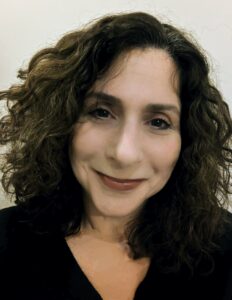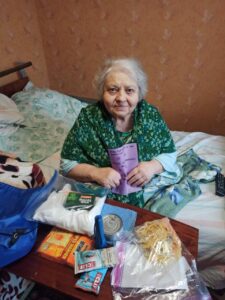By Sharon Longo, Contributing Writer

WALTHAM – Almost 5,000 miles away from Massachusetts, people in Ukraine are sheltering in basements, living amongst the ruins of their homes, while fighting against the Russian invasion and protecting their beloved country. In Waltham, an organization called Action for Post-Soviet Jewry (Action-PSJ) is taking action to help.
A long history of advocacy
Action for Post-Soviet Jewry began informally in 1974, becoming a 501(c)(3) non-profit in 1975. The purpose was to help Jewish people who were stuck in the Soviet Union so they could emigrate to the U.S. and Israel. When the Soviet Union fell in 1990, the organization decided to work to help support the smaller Jewish communities outside of the cities in Ukraine, Eastern Europe, and other former Soviet states.
By providing food, clothing, medicine, and other forms of help to these Jewish individuals, it works to galvanize and mobilize people here so they may help people there. Today it mostly helps in Ukraine.
When Action for Post-Soviet Jewry’s executive director retired after 40 years, it had to consider whether to close, but after receiving a small bequest, it decided to hire a replacement.
COVID was first big challenge
Debbie Kardon is the executive director of Action-PSJ, establishing new programs, while also raising funds for their implementation. She graduated from Syracuse University and Hebrew Union College with degrees in social work and Jewish education.
Kardon worked part-time while she was in college, teaching at a local congregation and then started her career helping teens who were at-risk and unhoused. She also worked in the Jewish community, eventually taking on leadership roles in Jewish non-profits.
When Kardon was hired for the position of executive director for Action-PSJ, she hoped to transform the legacy organization while modernizing it and envisioning its potential.
Only two weeks into her new leadership role, Kardon had to deal with the COVID pandemic as it changed that vision. Working to continually provide humanitarian assistance to meet the needs of the people in the former Soviet states, mostly Ukraine, it became necessary to pivot while rearranging the logistics of how to accomplish this goal. The difficulty became figuring out how to send aid to Ukraine: how to travel there and then navigate once they arrived.
New types of necessities such as medical supplies and PPE needed to be sent, and as the world began to “reopen,” it was necessary to plan for what life would look like as the world moved forward. “Work that was always so important and stable went into crisis mode for the last few years,” said Kardon. Then the war exploded in Ukraine.
Changing needs

Like COVID, no one could anticipate how long the war in Ukraine would last. As the war continues and changes, so do the needs of the people. “The needs are large and lifesaving and small and lifesaving,” Kardon explained. “We were asked to send EMT medical kits for the military and civilians. With bombs going off in the streets, a tourniquet can save a life while waiting for an ambulance to arrive.”
She continued, “We were also asked to send reflective gear. Most of Ukraine is in the dark without electricity for long periods of time. There are no streetlights or lights from buildings, and the people tend to dress in dark clothes,” Kardon noted. “The reflective gear could help them to be seen at night if they were to go out to the store or to visit an elderly person.”
Kardon praised the colleagues who work to support Ukraine in the area; one a project coordinator, as well as others throughout the country in various locations, some who have been displaced. “These are some of the most resilient and optimistic people I’ve ever met,” she said emphatically. “Someone told me I have a front-row seat to history unfolding. If I have a front-row seat, my colleagues are on stage. They are the foot soldiers helping people to survive as best they can. Work has become more intense but more meaningful.”
As Kardon described Action-PSJ and the work it does, she stated, “It’s very much a people-to-people organization. We know where our aid goes and who it goes to. We also have lots of partner organizations in Ukraine,” she explained. “The ripple effect is great. Ours is special because as many organizations meet the needs and provide large structural services such as food, we can provide help quickly and right away. That’s not to say that one organization is better than the other. We all weave the help together.”
How to help

When asked what people can do to help, Kardon’s answer was simple. “Send money. We use that to provide stipends to pay for food and meds. We also buy what’s needed in the moment. Now it is being used to buy lamps and heaters in Ukraine,” she noted. “We’ve also been collecting and sending hand and feet warmers, glow in the dark crafts for kids so they have something to do in the dark, flashlights and camp lights, incontinence supplies like Depends, protein bars, and over-the-counter medications like Motrin and vitamins.” She also mentioned that the lists of what’s needed are updated on their website monthly.
Kardon has one plea. “Please don’t forget. From the crisis at the beginning, through the long unending war, people don’t always keep focused on this,” she observed. “We all have to balance things in our lives, but we also need to keep a little space in our lives for others because the humanitarian crisis that might come out of that area is huge, and we have to keep shining a light there.”
For more information or to make a donation, go to https://www.actionpsj.org.
RELATED CONTENT:
Nonprofit RIP Medical Debt helps those in need (fiftyplusadvocate.com)












